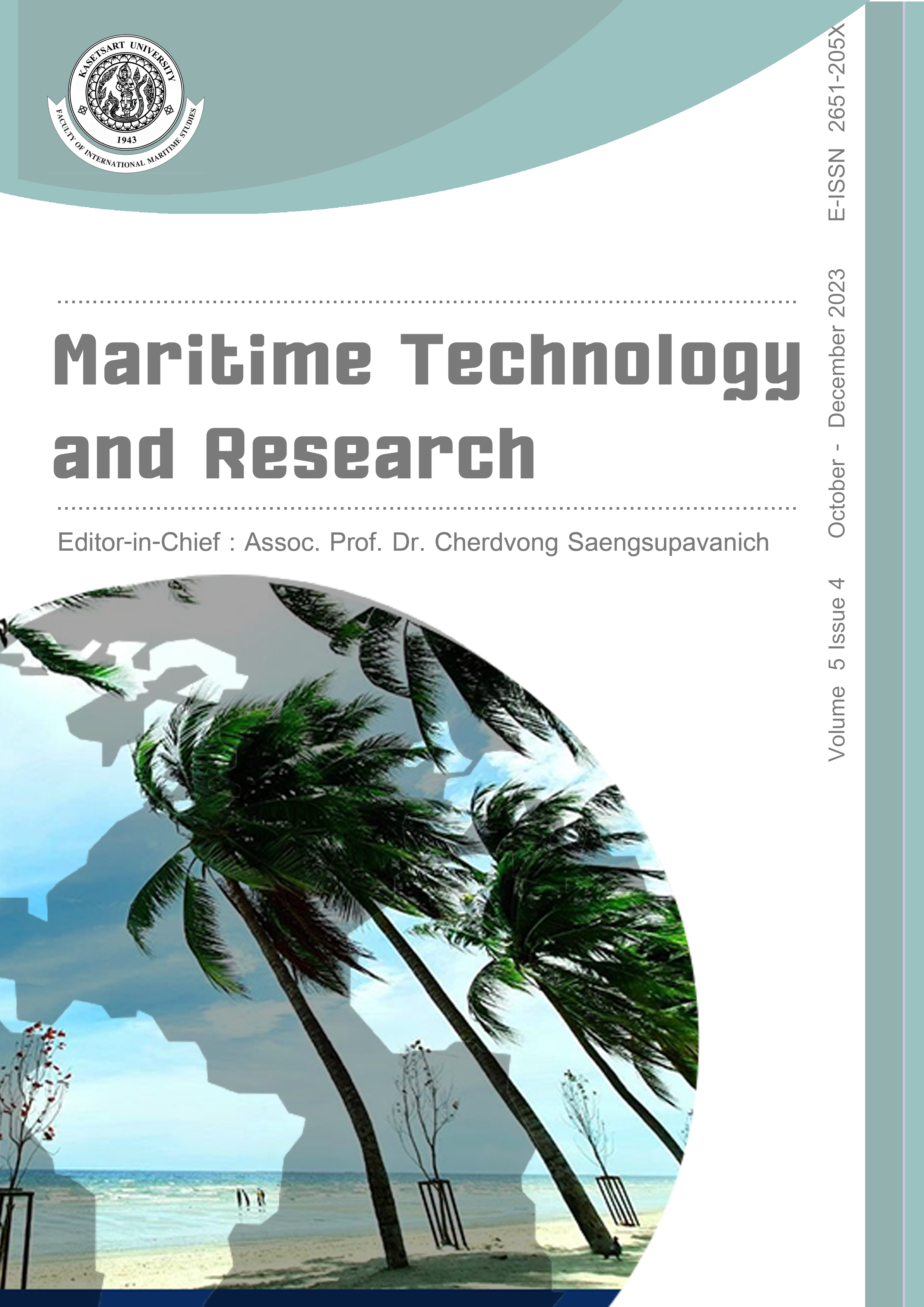Poverty, youth unemployment, maritime piracy, and sea robbery in Nigeria between 1995 and 2013: A relationship assessment
DOI:
https://doi.org/10.33175/mtr.2023.265349Keywords:
Maritime, Piracy, Sea-robbery, Poverty, UnemploymentAbstract
The study investigated the relationships between the poverty level in Nigeria and levels of global and local pirate attacks against ships on one hand; and between the unemployment rate in Nigeria and the level of local and global attack against ships, as well as the volume of cargo pilfered from Nigerian ports, on the other hand. The study employed secondary data sourced from the Nigerian Ports Authority, the National Bureau for Statistics (NBS), and the International Maritime Bureau (IMB) on the poverty rate, unemployment rate, levels of pirate attacks against ships in local and global waters, and volume of cargo pilferages in ports. The multiple regression analysis method was used to analyze the dataset obtained, using poverty rate and unemployment rate as the dependent variables in each case. It was found that poverty among dwellers is a component driver of maritime piracy and sea robbery against ships trading in Nigeria, since there is a significant relationship between the level of maritime insecurity and the rate of poverty in Nigeria. The study also found that there is a significant relationship between the level of maritime piracy/sea robbery and the unemployment rate in Nigeria.
------------------------------------------------------------------------------
Cite this article:
APA Style:
Ojutalayo, J.F., Boniface, N.O., Ugwu, N.K., Chidiebere, A.A.B., & Nwokedi, T.C. (2023). Poverty, youth unemployment, maritime piracy, and sea robbery in Nigeria between 1995 and 2013: A relationship assessment. Maritime Technology and Research, 5(4), 265349. https://doi.org/10.33175/mtr.2023.265349
MDPI Style:
Ojutalayo, J.F.; Boniface, N.O.; Ugwu, N.K.; Chidiebere, A.A.B.; Nwokedi, T.C. Poverty, youth unemployment, maritime piracy, and sea robbery in Nigeria between 1995 and 2013: A relationship assessment. Marit. Technol. Res. 2023, 5(4), 265349. https://doi.org/10.33175/mtr.2023.265349
Vancouver Style:
Ojutalayo JF, Boniface NO, Ugwu NK, Chidiebere AAB, Nwokedi TC. (2023). Poverty, youth unemployment, maritime piracy, and sea robbery in Nigeria between 1995 and 2013: A relationship assessment. Marit. Technol. Res. 5(4): 265349. https://doi.org/10.33175/mtr.2023.265349
------------------------------------------------------------------------------
Highlights
- Maritime insecurity in Nigeria waterways
- Pirate attacks against ships trading in Nigeria waters is linked to unrest in the Niger Delta region of Nigeria
- Maritime piracy in Nigeria waters is correlated with Poverty, unemployment, economic hardship in Nigeria
- Significant relationship exist between maritime insecurity and poverty rate in Nigeria
References
Afinotan, L. A., & Ojakorotu, V. (2009). The Niger delta crisis: issues, challenges and prospects. African Journal of Political Science and International Relations, 3(5), 191-198.
Bueger, C. (2013). Communities of security practice at work? The Emerging African Maritime Security Regime. African Security, 6, 297-316. https://doi.org/10.1080/19392206.2013.853579
Bushman, B. J., & Huesmann, L. R. (2010). Handbook of social psychology. Retrieved from https://www.researchgate.net/publication/277705818
Chalk, P. (2009). Maritime piracy: Reasons, dangers and solutions. Retrieved from https://www.rand.org/content/dam/rand/pubs/testimonies/2009/RAND_CT317.pdf
Chew, M. F. (2005). Piracy, maritime terrorism and regional interests (pp. 73-88). Copenhagen, Denmark: Danish Institute for International Studies.
Essien, B. S., & Adongoi, T. (2015). Sea piracy and security challenges of maritime business operators in Bayelsa state Nigeria: An Empirical study. International Journal of Humanities And Social Science, 5(2), 213-211.
International Maritime Bureau. (2014). ICC IMB piracy and armed robbery against ships. 2014 Annual Report, ICC International Maritime Bureau.
Jones, S. (2013). Maritime piracy: The challenge of providing long-term solutions. A working paper at the Maastricht School of Management. Retrieved from https://www.msm.nl
Madsen, J. V. (2013). The state of maritime piracy in 2013. Oceans beyond piracy. Retrieved from https://www.occeansbeyond piracy.org
Martínez-Zarzoso, I., & Bensassi, S. (2013). The price of modern maritime piracy. Defense and Peace Economics, 24, 397-418. https://doi.org/10.1080/10242694.2012.723156.
Nana, R., & Ofosu-Boateng, L. (2017). A SWOT analysis of maritime transportation and security in the Gulf of Guinea. Open Journal of Social Sciences, 5(8), 45-53.
Nwokedi, T., Odumodu, C. Z., Anyanwu, J., & Dike, D. (2020). Frustration-Aggression-Theory approach assessment of sea piracy and Armed Robbery in Nigerian Industrial Trawler Fishery Sub-Sector of the Blue Economy. Journal of ETA Maritime Science, 8(2), 114-132. https://dx.doi.org/10.5505/jems.2020.29053.
Ojutalayo, J. F. (2013). Analysis of the impact of maritime piracy and sea robbery on the Nigerian economy (Doctoral dissertations). Department of Maritime Management Technology, Federal University of Technology, Owerri.
Onuoha, F. C. (2012). Oil piracy in the Guld of Guinea. Conflict Trends, 2012, 28-35.
Whitman, S., Williamson, H., Sloan M., & Fanning, L. (2012). Dalhousie marine piracy project: Children and youth in marine piracy: Causes, consequences and the way forward (pp. 2-7). Marine Affairs Program Technical Report No.5, Dalhouse University, Halifax, Canada.
Wombwell, J. A. (2010). The long war against piracy: Historical trends (pp. 2-5). Occasional Paper 32, Combat Studies Institute Press, US Army Combined Arms Center, Fort Leavenworth, Kansas.
Wong, & Yip. (2012). Maritime piracy: An analysis of attacks and violence. International Journal of Shipping and Transport Logistics, 4(4), 306-322. https://doi.org/10.1504/IJSTL.2012.049315
Writer, S. (2014). IMB warns of West Africa piracy threat. Defence Web Online. Retrieved from https://www.defenceweb.co.za/security/maritime-security/imb-warns-of-west-africa-piracy-threat
Downloads
Published
Issue
Section
Categories
License
Copyright (c) 2023 Maritime Technology and Research

This work is licensed under a Creative Commons Attribution-NonCommercial-NoDerivatives 4.0 International License.
Copyright: CC BY-NC-ND 4.0








